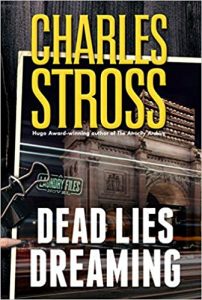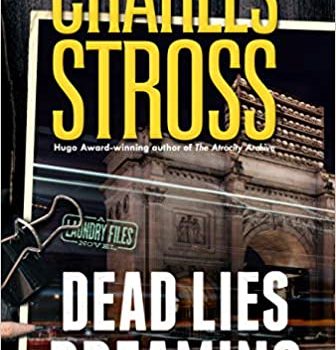Russell Letson Reviews Dead Lies Dreaming by Charles Stross
 Dead Lies Dreaming, Charles Stross (Tor 978-1-250-26702-3, $29.99, 384pp, hc) October 2020.
Dead Lies Dreaming, Charles Stross (Tor 978-1-250-26702-3, $29.99, 384pp, hc) October 2020.
When I first encountered Charles Stross’s Laundry series a decade or so ago, I took its comic-satiric mixture of spy thriller and Lovecraftian horror to be a genre-mashup game with which the author was amusing himself. The farther into the series I got, though – especially after reading the early, non-Laundry trunk novel, Scratch Monkey (2011) – the more I came to see that the horror-side nightmares are more haunted and haunting than the sometimes-antic joking or the bitterly satirical jabs at government bureaucracy might suggest. These days I am even more sensitive to the fantastic as a reflection of the actual, to the way that the front page headline or CNN lead story or Facebook conspiracy theory can generate bad dreams that emerge as dystopian novels, zombie apocalypses, and monster movies. Horror can offer something beyond carnival-ride frights or Grand Guignol gorefests, and those echoes of the disturbing in ordinary life are what I’ve come to see in Stross’s work.
The Laundry-universe standard recipe combines eldritch threat and workplace satire with some ingredient adapted from the thriller family. In the past that third element has most often come from the espionage-intrigue tradition, but this time it’s from the crime-caper branch. Dead Lies Dreaming leaves behind the Laundry agency and its roster of computational demonologists, combat epistemologists, and vampiric ex-bankers, to explore the civilian side of a UK governed by the “New Management,” headed by a revived Elder God as Prime Minister and policed by faerie enforcers and superpowered cops. But government does not hold a monopoly on magic, and private-sector security firms happily employ people with special gifts, tasked with chasing down similarly talented criminals.
Also at large in the book are Peter Pan references and echoes, mostly in the diverse and interestingly-related cast. At the center is a band of Lost Boys and Girls squatting in an abandoned London mansion and supporting themselves by using their oddball exotic talents to conduct various kinds of thievery. Imp (mind-manipulator) is more or less Peter Pan and ringleader of a tribe that includes Game Boy (telekineticist), Doc Depression (broadcaster of emotions), and the Deliverator (transport/getaway wizard). All are rejects, outcasts, and misfits – social, sexual, economic, and familial exiles. Imp in particular has a family history that will drag them all into metaphysically deadly territory.
The story opens with a sample heist, as Imp’s crew bamboozles its way through the robbery of a toy-store payroll office, which exploit brings them to the attention of ex-cop and current corporate thief-taker (a revival of an 18th-century job description) Wendy Deere. Meanwhile, Evelyn Starkey, executive assistant, fixer, and problem-burier (in the sub-basements) to criminal plutocrat and general creep Rupert Bigge, is ordered to track down and acquire a unique magical book that will give its possessor occult power. Rupert (in his role as secret high priest of another elder god) needs it, “whatever it costs” in money, blood, or lives. After a number of reverses and literal dead ends, Eve hires Imp – who, it turns out, is her younger brother – to retrieve it from its hiding place, which in turn pulls Wendy into the treasure hunt. Also in the mix: a highly effective psycho-killer/problem-solver called only “Bond” (because that’s what Rupert calls all his assassin-operatives) and a Russian mafiya (“Transnistrian, please”) financial outfit that can provide more than money-laundering and asset-obfuscating services.
As the search for the book intensifies, its horrible nature and back-story are gradually revealed, along with the nature of its hiding place and the connection of both to the Starkey family. In-the-open and secret agendas abound, which is, of course, another element of the crime-caper formula: questions of who is to be trusted, who is going to betray whom, when, and in what manner. We know that Eve would love to undermine and replace her boss; that Rupert is entirely willing to sacrifice (perhaps literally) any of his human assets in order to advance his ambitions; that the Bond is no more loyal than any other paid psychopath; and that thieves will fall out. But the book’s history and its mode of operation impose its own agenda on the cast members and the story as a whole.
The setting for all this hugger-mugger and backstabbery is a UK firmly in the grip of the New Management – the Bloody Code is back in fashion (another of the 18th-century’s Greatest Hits – gaudy capital punishment) and competing sets of eldritch forces maneuver for entry into our hapless continuum. As nasty as that situation is, the ordinary, material-world situation is odious in a way familiar from recent news coverage of the UK socioeconomic scene, and Rupert’s secular business philosophy is pretty much in tune with that of the un-magical rich-and-powerful who run everything: privatization, outsourcing, asset-stripping, labor exploitation, and expansion of the ever-widening gap between the super-rich and everybody else.
The urban landscape through which Imp & Co., Wendy, and Eve chase the book (and are chased) reflects this. The squat that serves as the Imp gang’s headquarters was originally owned by his family, in a once-snooty neighborhood where all the properties are now owned by offshore funds and left to decay as empty investment vehicles – though the youngsters have employed their urban-hacker skills to make it secure and comfy. Wendy, theoretically gainfully employed, lives much less pleasantly, paycheck-to-paycheck, in a tatty bed-sit carved out of a semi-detached family home waiting to be leveled by the next wave of gentrification. Rupert’s home/HQ in Knightsbridge, on the other hand, features “a cinema, swimming pool, boardroom, library, prayer room, panic room, owner’s den, staff offices…. [I]n short, a typical billionaire supervillain’s London town house.”
Nevertheless, the worst dangers lie in the landscapes lurking in the neverland behind the sealed-shut door in the attic of Imp’s squat, an extradimensional maze of corridors and stairways leading to “the ghost roads, arcane liminal spaces that linked places and times: … to other parallel universes, and to the dream palaces of oneiromancer dynasties.” Doorways into various pasts, and the Blitz and Jack the Ripper ain’t the half of it:
London in 1888, but not the London the history books described. This was a London born of the folkloric horror myths that future London told about its past. A London in which magic had never guttered and died, a London liminal and unstable in its absolute form, crumbling away in the yellowish pea-souper smog clouds that pervaded the frayed edges of reality…. This was not the real Whitechapel of 1888 but the Whitechapel of the clichéd collective unconscious….
In that world of might-have-beens, the competing forces converge on the object of desire, where surprises abound, trapdoors open, herds are thinned, and unexpected participants operate from the shadows. In parallel with this present-action climax, flashbacks illuminate the dread nature of the forces in play and some of the relationships among cast members.
For all of its headline-news echoes, Dead Lies Dreaming is not quite an allegory, but an eldritch nightmare of busy monsters doing their monstrous business, into which have leaked some of our more mundane bad dreams – which, I suppose, is better than having it the other way around.
Russell Letson, Contributing Editor, is a not-quite-retired freelance writer living in St. Cloud, Minnesota. He has been loitering around the SF world since childhood and been writing about it since his long-ago grad school days. In between, he published a good bit of business-technology and music journalism. He is still working on a book about Hawaiian slack key guitar.
This review and more like it in the October 2020 issue of Locus.
 While you are here, please take a moment to support Locus with a one-time or recurring donation. We rely on reader donations to keep the magazine and site going, and would like to keep the site paywall free, but WE NEED YOUR FINANCIAL SUPPORT to continue quality coverage of the science fiction and fantasy field.
While you are here, please take a moment to support Locus with a one-time or recurring donation. We rely on reader donations to keep the magazine and site going, and would like to keep the site paywall free, but WE NEED YOUR FINANCIAL SUPPORT to continue quality coverage of the science fiction and fantasy field.
©Locus Magazine. Copyrighted material may not be republished without permission of LSFF.







